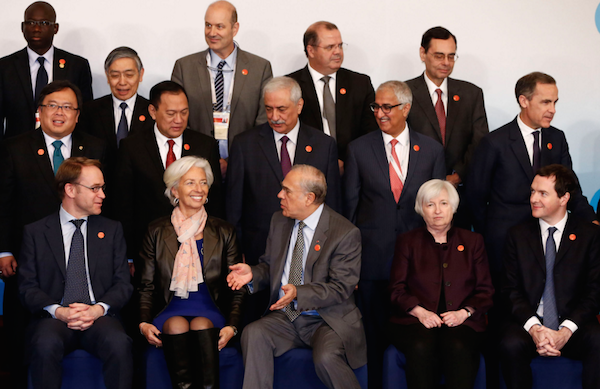Anyone hoping this week’s G-20 meeting would yield some manner of “Shanghai Accord” to revive sluggish global growth, pull the global economy out of the deflationary doldrums and calm jittery markets that have seen harrowing bouts of volatility in the first two months of the year are disappointed on Saturday.
The joint communique issued by policymakers at the end of the two-day summit is bland and generic, with officials parroting vacuous promises to avoid competitive currency devaluations and maintain monetary policies aimed at supporting economic activity and price stability.
Officials pledged to “consult closely” on FX markets, a reference presumably to China’s “surprise” August 11 deval and the PBoC’s move in December to adopt a trade weighted basket as a reference point for the RMB, a move that telegraphed lots of downside for the currency.
The statement also “acknowledges” the fact that geopolitical risks abound and as Bloomberg noted this morning, “officials added a potential ‘Brexit’ to its long worry list in the communique.”
“That’s a win for Chancellor of the Exchequer George Osborne, who had sought to rally international finance chiefs behind the campaign to keep Britain in the European Union,” Bloomberg goes on to point out.
“Downside risks and vulnerabilities have risen,” due to volatile capital flows and slumping commodities but – and this was a critical passage – “monetary policy alone cannot lead to balanced growth.”
What?! We thought counter-cyclical Keynesian tinkering was the magic elixir. A cure-all that smooths business cycles and creates demand out of thin air. Now you’re telling us it “can’t lead to balanced growth” and implicitly that Paul Krugman is a snake oil salesman? This can’t be.

(Janet is not amused)
“The global recovery continues, but it remains uneven and falls short of our ambition for strong, sustainable and balanced growth,” the statement continues, in a rather dour assessment of the economic landscape. “While recognizing these challenges, we nevertheless judge that the magnitude of recent market volatility has not reflected the underlying fundamentals of the global economy,” officials added.












Leave A Comment